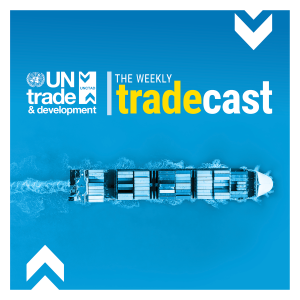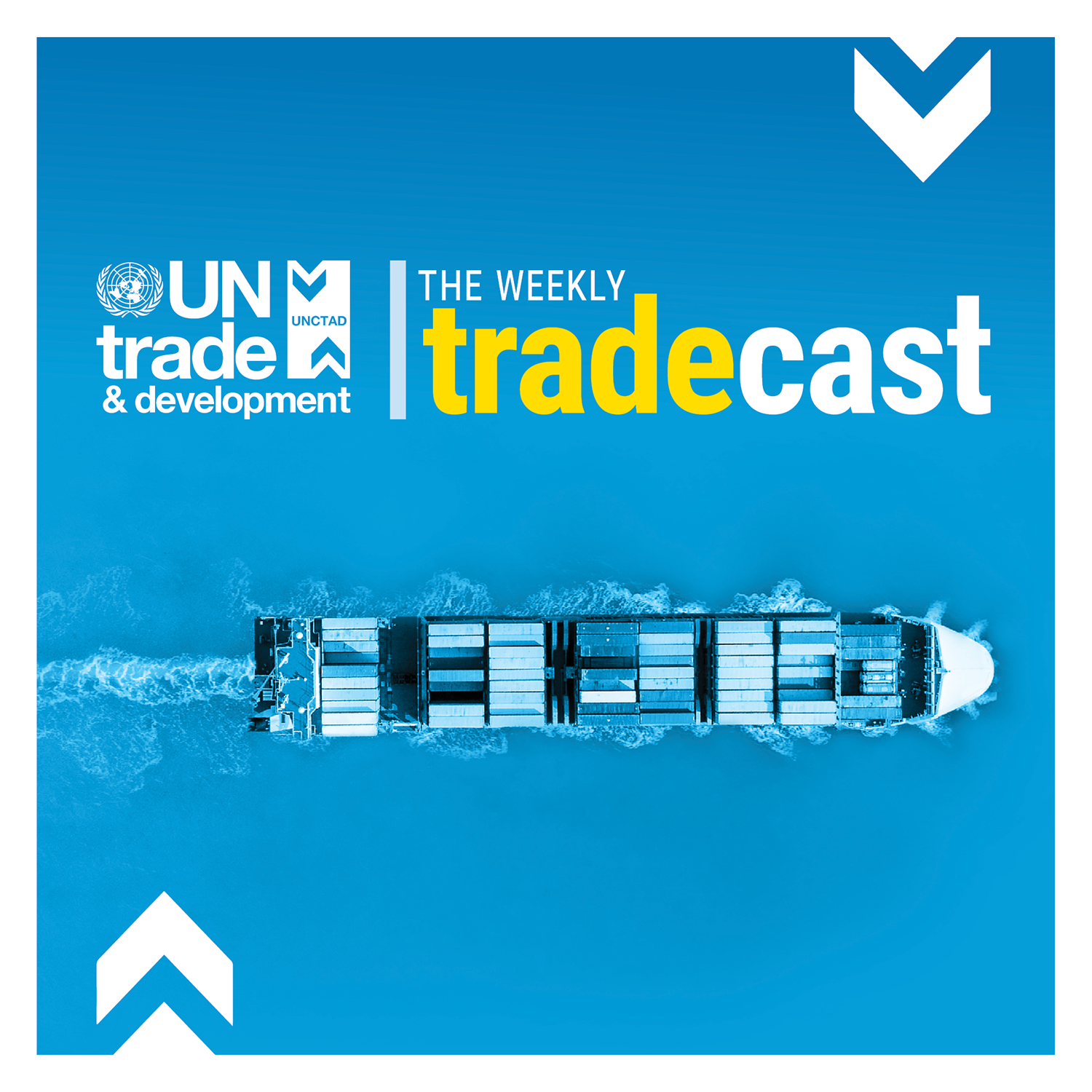Episodes
Episodes



Tuesday Jul 16, 2024
Tuesday Jul 16, 2024
The Weekly Tradecast looks at the Sustainable Development Goals with a special guest - Marina Ponti, Director of the UN SDGs Action Campaign.
In 2015, UN members signed up to 17 SDGs that range from ending extreme poverty to tackling the climate crisis. The goals are supposed to be met by 2030 to fulfil the promise of a better future for people and the planet.
But trillions of dollars are needed to meet the targets - and efforts are faltering at a time of turmoil and tensions.
Since 1964, when UN Trade and Development was created to promote a fairer economic system, the world has seen many sets of challenges and opportunities. Now - and into the future - the SDGs are vital ways to improve people's lives by addressing inequality, sustainability and climate change.
Tune in to the UN's Marina Ponti to find out how can we get back on track.



Friday Jul 12, 2024
Friday Jul 12, 2024
The Weekly Tradecast looks at the Digital Economy Report from UN Trade and Development (UNCTAD) with Torbjorn Fredriksson.
Around the world, greater access to technology has revolutionised the way we live and work. While the changes are delivering many benefits, the new report says how we manage the digital transformation will have a major influence on the future of humanity and the health of our planet.
With technology and digitalisation evolving quickly, the environmental footprint is also growing - from the rising demand for minerals, water and energy to the creation of more pollution and waste.
For many developing countries, they are seeing only limited benefits from the digital economy but are highly exposed to the environmental impact.
Listen in to Torbjorn Fredriksson, Head of the E-commerce and Digital Economy Branch, to hear how new business models, policies and strategies can help maximise the positive aspects of digitalisation and minimise the negative effects.



Thursday Jul 04, 2024
Thursday Jul 04, 2024
The Weekly Tradecast dives into the benefits and potential of seaweed with UN Trade and Development lawyer David Vivas.
Climate change is affecting harvests around the globe. But seaweed is one of the few food crops that have a positive effect on the environment.
It’s also high in protein, making it a promising substitute for meat and an even more sustainable alternative than soya.
Seaweed also has potential in pharmaceuticals and as a substitute for some plastics, reducing the use of fossil fuels that are a main cause of climate change.
To find out more, listen in to UN Trade and Development’s David Vivas for how this versatile plant could transform many parts of our lives.
BBC credit



Thursday Jun 27, 2024
101. #UNCTAD60: Charting a new course for development at the Global Leaders Forum
Thursday Jun 27, 2024
Thursday Jun 27, 2024
The Weekly Tradecast looks at why we need to chart a new course for development – with insights from our Global Leaders Forum.
UN Trade and Development is celebrating our 60th year of promoting a fairer economic system and access to the benefits of global trade. As we mark this milestone of transforming people’s lives, we're also evolving to meet the challenges and opportunities ahead.
"Charting a new development course in a changing world" was the focus of our recent anniversary event in Geneva with hundreds of senior officials and leading thinkers.
In the face of crises and complexities, tune in to this week’s episode to find out how we can build a better future.



Thursday Jun 20, 2024
Thursday Jun 20, 2024
The Weekly Tradecast looks at the World Investment Report 2024 and the latest trends with UN Trade and Development’s (UNCTAD) Richard Bolwijn.
Global flows of foreign direct investment (FDI) declined by 2% to $1.3 trillion dollars last year.
The headline number included big swings in a small number of conduit economies – which often act as intermediaries for FDI destined for other countries. Without those drivers, FDI globally would have been even lower.
This year should be better but risks and uncertainties persist – especially for developing countries that need investment to grow now and adapt in the future.
Tune in to Richard Bolwijn, Head of Investment Research, to hear how investment policies and decisions are being shaped by technology, sustainability and geopolitical tensions.



Wednesday Jun 12, 2024
99. #UNCTAD60: Rebeca Grynspan on charting a new course for development
Wednesday Jun 12, 2024
Wednesday Jun 12, 2024
The Weekly Tradecast looks at today's challenges and the opportunities of tomorrow with special guest UN Trade and Development Secretary-General Rebeca Grynspan.
We’ll be talking about her vision for UN Trade and Development, how to address new challenges and why we must move forward together to create an inclusive and sustainable future.
Founded in 1964 as the United Nations Conference on Trade and Development – or UNCTAD – our organization promotes a fairer economic system and helps developing countries to access the benefits of global trade.
Now UN Trade and Development is building on six decades of success as our work evolves to keep improving the lives of billions of people around the world.
Tune in to Secretary-General Rebeca Grynspan to find out what it takes to lead this global organization and get her perspective on the course of development in a changing world.



Friday Jun 07, 2024
Friday Jun 07, 2024
The Weekly Tradecast looks at the evolution of science and technology with one of the most influential women in UK tech, special guest Sana Khareghani.
Since 1964, when UN Trade and Development was created, the world has seen a series of new realities, challenges and opportunities.
These days, advances in artificial intelligence and other technologies are racing ahead, transforming education, finance, medicine and many other fields at a lightning pace.
The benefits are enormous but so are the risks. As some countries, sectors and workers see great gains, others may lose out.
With technology such a driving force, listen to Sana Khareghani, professor of practice in AI at King’s College London, to find out how to get on track to a better future for all.



Thursday May 30, 2024
97. The future of AI: Why innovation and regulation must go hand-in-hand
Thursday May 30, 2024
Thursday May 30, 2024
The Weekly Tradecast looks at the future of Artificial Intelligence (AI) and the need for rules to balance the benefits and risks with UN Trade and Development (UNCTAD) legal expert Arnau Izaguerri Vila.
Innovations in AI are racing ahead as machines get better and faster at analysing information on a vast scale. Already, the advances are transforming many fields of work and also reshaping our social interactions.
The potential benefits are enormous but so too are the risks. As some countries, sectors and workers see great gains, others may lose out. And as AI blurs the boundaries of reality, it creates worrying new tools for disinformation.
To keep up with these astonishing advances, tune in to Arnau Vila and find out why the United Nations says we need bold strategies and broad cooperation to develop shared standards around AI.






